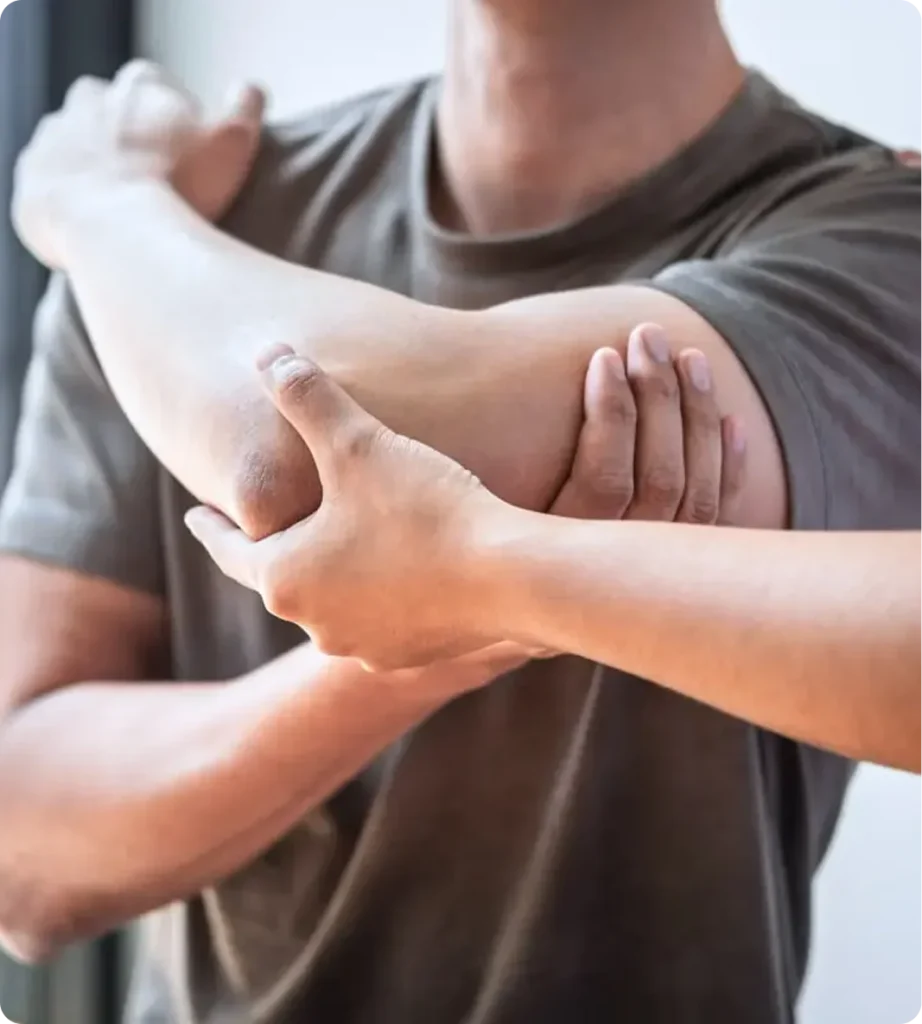Myopathy Treatment in Delhi
by Dr. Shishir Pandey – Expert Neurological Care

What is Myopathy?
Myopathy is a medical term that simply means a disease affecting the muscles. If you’ve been experiencing unexplained muscle weakness, fatigue, or difficulty performing everyday routine tasks, such as climbing stairs or lifting objects, myopathy could be one of the underlying causes.
In myopathy, the muscle fibres do not function properly. It leads to weakness, and in some cases, pain or stiffness may occur. It’s important to know that this isn’t the same as nerve problems, though muscles and nerves are closely connected.
That’s why a neurologist is the best specialist to diagnose and treat myopathy, especially when symptoms are subtle or confusing.
There are two broad types:
Primary (Inherited) Myopathies
These are genetic and often show up in childhood or early adulthood. Examples include muscular dystrophies and congenital myopathies.
Secondary (Acquired) Myopathies
These develop later in life due to causes like inflammation, medications, thyroid disorders, or infections.

Common Symptoms of Myopathy
The most noticeable sign of myopathy is progressive muscle weakness. It often starts subtly—maybe you’re struggling to climb stairs, feeling unusually tired after walking short distances, or finding it hard to lift your arms above your head.
Here are some of the most common symptoms people with myopathy experience:
Muscle weakness, especially in the shoulders, upper arms, thighs, or neck
Persistent fatigue, even after minimal physical effort
Difficulty with daily activities like getting up from a chair, combing your hair, or carrying groceries
Muscle cramps or stiffness, sometimes with mild pain
In more advanced cases, problems with swallowing or breathing can occur, especially if the muscles involved in those functions are affected
These symptoms can progress gradually or appear more suddenly, depending on the type of myopathy.
Causes And Types of Myopathy
Each person feels myopathy differently. Some people are born with it,, whereas others acquire it later in life. Finding the root cause is essential for treating it.
Here are the major types of myopathy:
Inherited (Genetic) Myopathies
These are passed down through families and usually show symptoms early in life. Examples include:
Muscular Dystrophy
progressive muscle weakness and wasting
Congenital Myopathies
present from birth, often affecting movement and posture
Metabolic Myopathies
where the muscles can’t properly use energy, leading to fatigue and cramps
Acquired (Secondary) Myopathies
These develop later in life due to:
Inflammation (e.g., polymyositis, dermatomyositis)
Certain medications or toxins (e.g., statins, alcohol)
Hormonal issues like thyroid dysfunction
Infections or autoimmune diseases
Nutritional deficiencies
Regardless of the type, all forms of myopathy affect muscle health, and diagnosing the exact cause is key.
That’s why consulting a neurologist like Dr. Shishir Pandey, who specialises in neuromuscular disorders, is essential for accurate evaluation and long-term care.
How Myopathy is Diagnosed by a Neurologist
Diagnosing myopathy isn’t always straightforward—many muscle and nerve conditions can look similar at first. That’s why it’s crucial to undergo a thorough evaluation by a neurologist who specialises in neuromuscular disorders.
When you visit Dr. Shishir Pandey, here’s what the diagnostic process may include:
Detailed Medical History &
Physical Exam
The first step is understanding your symptoms, family history, and any medications you’re taking. Dr. Pandey will also check muscle strength, reflexes, and coordination.
Blood
Tests
A key test is checking creatine kinase (CK) levels—an enzyme that leaks into the blood when muscles are damaged.
EMG (Electromyography) & Nerve Conduction Studies
These tests assess the health of your muscles and nerves by measuring electrical activity.
MRI of the Muscles
Imaging helps visualise muscle inflammation, fat replacement, or other structural changes.
Muscle Biopsy (if needed)
In some cases, a small sample of muscle tissue is taken for lab analysis to confirm the type of myopathy.
Genetic Testing
For inherited myopathies, genetic tests can identify specific mutations and guide future care.
Each case is unique, and Dr. Shishir Pandey combines advanced diagnostics with a personalised approach to ensure nothing is missed.
Treatment Options for Myopathy in Delhi
Treating myopathy starts with identifying its cause, and that’s where neurologists like Dr. Shishir Pandey in Delhi play a vital role.
Myopathy treatment isn’t “one-size-fits-all.” It’s a tailored plan based on whether the condition is inherited, inflammatory, or secondary to another health issue.
Depending on the type of myopathy, treatment may include:
Medications
- Steroids or immunosuppressants for inflammatory myopathies
- Thyroid medications or metabolic supplements for hormone-related cases
- Adjusting or stopping any drugs that might be causing muscle damage
Physiotherapy & Muscle Rehabilitation
- Targeted exercises to maintain strength and prevent stiffness
- Mobility aids (if needed) to support independence

Nutritional & Lifestyle Management
- Addressing vitamin deficiencies or metabolic imbalances
- Customised dietary advice for energy support
Monitoring for Complications
- Breathing or swallowing assessments
- Coordination with pulmonologists or physiotherapists if required

Why Choose Dr. Shishir Pandey for Myopathy Treatment in Delhi?
When it comes to muscle weakness or neuromuscular disorders, you need more than just a diagnosis—you need a neurologist who truly understands the complexity of the condition and provides compassionate, long-term care.
Here’s why patients across Delhi trust Dr. Shishir Pandey:
Specialised Expertise in Neuromuscular Disorders
Dr. Shishir has advanced training in diagnosing and managing conditions like myopathy, making him one of the few neurologists in Delhi with focused experience in this area.
State-of-the-Art
Diagnostic Tools
From EMG and nerve conduction studies to genetic evaluations, you get access to cutting-edge testing under one roof.
Patient-Centred
Approach
Every treatment plan is customised—not just based on the medical condition, but also on your lifestyle, comfort, and long-term goals.
Trusted by Patients,
Recommended by Peers
With a reputation for being thorough, empathetic, and up-to-date with the latest in neurology, Dr. Pandey is a go-to expert for both common and complex muscle disorders in Delhi.
Whether your symptoms are mild or significantly affecting your day-to-day life, you’re in safe hands with Dr. Shishir Pandey.
Frequently Asked Questions About Myopathy
It depends on the type. Some inherited myopathies are lifelong but manageable, while others, like inflammatory or drug-induced types, can improve significantly with timely treatment.
While not all myopathies are curable, many are treatable and manageable. With the right neurologist and care plan, symptoms can be controlled and progression slowed.
The symptoms can overlap with other nerve or joint problems. A neurologist like Dr. Shishir Pandey uses specialised tests like EMG and MRI to pinpoint the exact cause.
Some types, such as muscular dystrophy, are genetic and can run in families. Others are acquired later in life due to inflammation, medications, or hormonal imbalances.
If you’re finding it harder to climb stairs, lift your arms, or feel fatigued even with minimal activity, it’s best to consult a neurologist in Delhi early, especially if the weakness persists or worsens.
